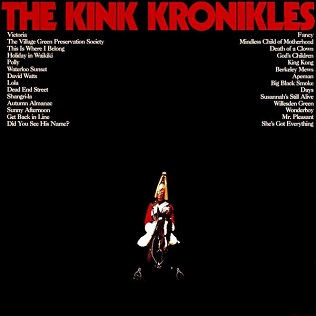The Kink Kronikles
| The Kink Kronikles | ||||
|---|---|---|---|---|
 |
||||
| Compilation album by The Kinks | ||||
| Released | March 25, 1972 | |||
| Genre | Rock | |||
| Length | 82:35 | |||
| Label | Reprise | |||
| The Kinks chronology | ||||
|
||||
| Professional ratings | |
|---|---|
| Review scores | |
| Source | Rating |
| Allmusic |
|
| Robert Christgau | A |
| Rolling Stone | (favourable) |
The Kink Kronikles is a compilation double album by The Kinks, released on Reprise Records in 1972, after the band had signed with RCA Records in 1971. It comprises mostly singles with five tracks taken from albums released by the band from 1966 to 1971; two tracks were previously unreleased. Designed specifically for the American market, it peaked at #94 on the Billboard 200.
After The Kinks failed to renew their American distribution contract with Reprise, the label assembled this compilation without input from the band. Instead, Reprise invited rock journalist and noted Kinks fan John Mendelsohn to compile this package, ignoring the band's early trademark hits already appearing on Greatest Hits! Mendelsohn also contributed the liner notes.
The album contains all five singles that charted on the Billboard Hot 100 during the time period covered, two of which appear on album in the United States for the first time: "Dead End Street" and "Mr. Pleasant." Five tracks made their United States debut in any format here – "Berkeley Mews," "Willesden Green," "This Is Where I Belong," "Did You See His Name?" and "King Kong." The latter two were original to this compilation, and "King Kong" would be released as a single two months after the release of this double album.
An exemplary compilation, in 2003 the album was ranked number 232 on Rolling Stone magazine's list of the 500 greatest albums of all time. It became an important milestone in the Kinks' career by introducing highlights of the band's England-centered 1966-1970 period to American audiences. Never properly remastered for compact disc, track listing on disc is identical placing sides one and two on disc one and sides three and four on disc two.
...
Wikipedia
